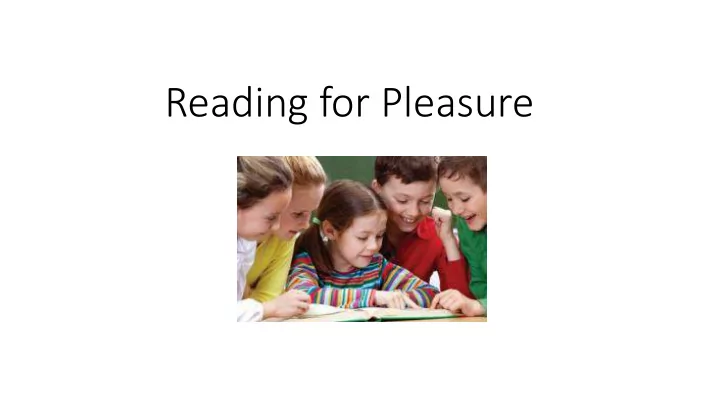

Reading for Pleasure
“The more that you read, the more things you will know. The more you learn, the more places you’ll go” – Dr Seuss “Books shouldn't be daunting, they should be funny, exciting and wonderful; and learning to be a reader gives a terrific advantage. “ – Roald Dahl
What we’ll talk about today • The benefits reading offers your child • The power of reading • Reading for pleasure • Help with ideas to encourage your child to read at home • Questioning strategies
Why read? Reading helps children: • Understand the world around them. • Develop social and emotional skills. • Improve at school in English, science, maths and other subjects. • Build confidence with communication. • Strengthen their bond with you and other family members.
The power of reading • Just 10 minutes of reading with your child each day is one of the best ways you can support their education. • Reading aloud is a great opportunity to share and bond with your child.
Reading at home • Have books visible in your home • Be a role model, let your children see you reading. • Read and share books every day • Boys especially need to see that reading is something men do • Talk about books • Make time in your day to sit and listen to your child reading • Give them choices about what to read
How to help if your child chooses not to read • First of all, don’t panic! • ‘Let them choose books that appeal to them • Find books to share that match your child’s interest • Continue to role modelling reading, let them see you read • Take the strain, read aloud to your child • You can’ t make someone read. Just like you can’t make them fall in love, or dream…’ The Rights of the Reader – Daniel Pennac
Closed Questions Closed Questions • Do you like this book? • Do you like this character? Useful closed Questions • Who are the main characters • Where is the story set? • Is it summer or winter?
Open questions • What do you like about this book? • What can you tell me about the main character? • How do you know it is summer? • How do you know the book is set in Victorian times? • What would you do in that situation?
Reading with your children • It’s not all about stories. Let them see different types of books - not just fiction, but non-fiction, poetry, joke books, magazines • Try to use different, funny voices for characters • Make it personal. Nothing kills enjoyment of a book faster than being asked to write a review. • The best question to ask is, ‘What are you going to try next?’
Design a Reading Corner
The Rights of the Reader 1. The right not to read. 2. The right to skip. 3. The right not to finish a book. 4. The right to read it again. 5. The right to read anything. 6. The right to mistake a book for real life. 7. The right to read anywhere. 8. The right to dip in. 9. The right to read out loud. 10. The right to be quiet. Daniel Pennac – The Rights of the Reader
Recommend
More recommend